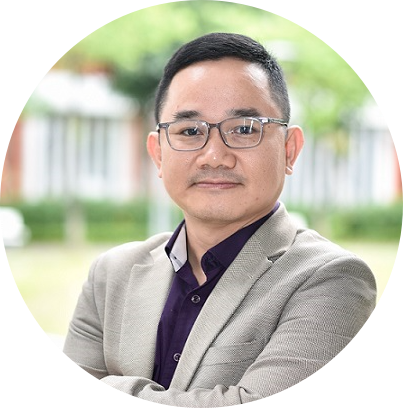
Prof. Dr. Duc-Tan Tran is currently a full Professor and Vice Dean at the Faculty of Electrical and Electronic Engineering at Phenikaa University. Prior to joining Phenikaa University, Dr. Tan was an Associate Professor at the Faculty of Electronics and Telecommunication, VNU University of Engineering and Technology. He also served as the Vice Dean of the faculty from August 2016 to May 2019. He has published over 150 research papers and has been awarded the "Best Paper Award" at the 9th International Conference on Multimedia and Ubiquitous Engineering (MUE-15) and the International Conference on Green and Human Information Technology (ICGHIT - 2015). In 2008, he was recognized as an excellent young researcher by Vietnam National University, Hanoi, and was a warded the third prize in the "Vietnamese Talents" contest. His primary research interests include the representation, processing, analysis, and communication of information embedded in signals and datasets. Tran actively participates in international conferences and journals by serving as a TP Co-chair, technical committee program member, track chair, session chair, and reviewer.
Abstract: Wearable technology is rapidly transforming healthcare and emergency response, offering real-time monitoring and intelligent decision-making through accelerometers, IoT connectivity, and machine learning. This keynote will explore how these technologies enable novel applications in healthcare—such as activity recognition, gait analysis, and early disease detection—as well as firefighter support systems for safety and performance monitoring in hazardous environments. By leveraging advanced sensing, real-time data processing, and AI-driven analytics, we can create adaptive, context-aware solutions that enhance well-being, improve patient outcomes, and provide critical support for first responders. The talk will highlight key challenges, opportunities, and future directions in developing deployable, high-impact wearable systems that bridge the gap between research and real-world implementation.

Dr. Phung Manh Duong has had over 15 years of teaching and research experience at the tertiary education level including the lecturer position at the University of Technology Sydney (5 years) and Western Sydney University (4 years). He is passionate about exploring new teaching methods for engineering and was among the initiators of the studio-based teaching approach being used at the University of Technology Sydney and others. Apart from teaching, Dr. Phung actively participated in research activities. He has conducted a number of research projects with both academia and industry partners, such as NTT Cyber Solution Laboratory, Japan, Mechatronics and Automation Laboratory of National University of Singapore, Samsung Vietnam Mobile R&D Centre, and the Australian Department of Defence. Dr. Phung served as the organizing committee member of many international conferences with the roles of publication chair and international coordination chair. He is also the reviewer for reputable journals of IEEE, Elsevier and Springer such as IEEE Transactions on Intelligent Transportation Systems and Automation in Construction Journal. Dr. Phung was the recipient of many research awards including the Endeavour Research Fellowship of the Australian Government and the Best Paper Award of the Australasian Conference on Robotics and Automation 2019.
Abstract: Unmanned Aerial Vehicles (UAVs) have revolutionized numerous applications, including surveillance, disaster response, environmental monitoring, and precision agriculture. As UAV operations become increasingly complex, effective path planning and formation control are critical for optimizing performance, energy efficiency, and mission success. This keynote speech will explore recent advances in UAV path planning and formation control, highlighting developments in modelling, multi-agent coordination, and obstacle avoidance using optimization and control techniques. Additionally, emerging trends such as swarm intelligence, learning-based algorithms, and real-time decision-making in dynamic environments will be discussed. The talk will also address open challenges and future research directions, paving the way for next-generation UAV systems that are more autonomous, resilient, and scalable.